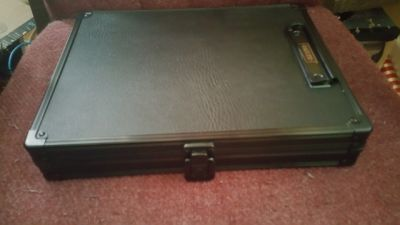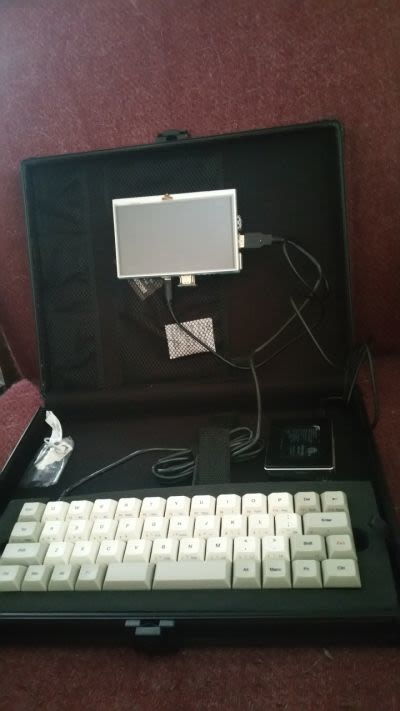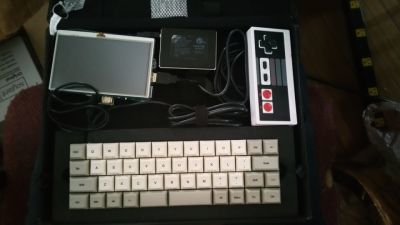I need a laptop

Not to make lite of persons with actual addictions, but I have something of an addiction to single board computers (SBCs) and portable computers. I have several laptops, mobile devices, and hobbyist equipment that any sane person needing such a solution probably wouldn't have bought.
What I have
I have a pair of Sharp Zaurus that sit on a shelf. I have a Zipit Messenger with a custom Linux build on it. I have a few Andriod tablets, two 2.0 devices that were unbelievably cheap and also too underpowered to be of any use. One of them has the best resistive touch screen I've ever used on any device ever. Unfortunately I dropped that one and cracked it. I have some Android phones, a Motorola Flipout -- awesome physical keyboard, but no updates, ever -- a Samsung Galaxy Note 3, and a Note 4. I have a Tegra based tablet, and a more recent tablet, too, a Samsung Galaxy Note something or other 10 inch powerhouse of awesomeness. I have some Eeepcs. I have some Zenith DOS laptops. I have a TRS-80 Model 100. I have a G3 iBook. I have a 2011 MacBook Air.
But my confession doesn't end there. I have one RasPi one, two twos, and I'm up to three threes. I also have a Tinkerboard, a Pine64, and a Pinebook.
The confession continues! I just dropped some steem dollars to pre-order an EOMA68 card, too.
I've probably missed a few computers. Oh, I have a PocketChip, too.
So, what ones do I actually use? I use the Note 4, the Galaxy Note tablet, the Tinkerboard, all three of the Pi3, the Pine64, and even the TRS 80. I use these more than any of the others. Some of the others I do power up occasionally for tinkering. There is some Python stuff that I've been playing with forever on the PocketChip... But where am I going with this?
The Notes are wonderful for notes and language learning. They have screen clipping and drawing applications that make it quite pleasurable to compose notes. Well, they used to. Samsung decided S-Note wasn't good enough so they produced Samsung Notes. Then they updated S-Note and broke Unicode fonts. I don't mind writing all my Chinese/Japanese/etc notes by hand, I do this anyway, but not being able to type in the correct character is really irritating. Any typed characters are converted to missing glyph boxes. Existing notes were fine, but any newly added text boxes are broken. Why don't I use Samsung Notes? Because it didn't import my old notes with anything resembling fidelity. I started doing some new notes in Samsung Notes, but it doesn't let you annotate, position, or format pasted images, either. So now the note devices are back to just being PDAs with the added benefit of taking massive SD cards, so my language practice stuff is on them, too.
The Pi's are serving up media to the local area network. One PI3 is for radio stuff. The last PI3 is for random stuff, currently that's connected to my eink display. The PI1 used to serve media to the network, but it couldn't keep up with demand. I also had some accessibility stuff installed so that I could have it plugged into a battery and use it with headphones and a keyboard, but I couldn't come up with a good way to use vim with a screen reader. In hindsight, I should have just used ex. Plugged in to my 12AH battery it would get better than 24 hours of continuous use, and that was awesome. But it was too clumsy to write documents. I should probably research more on what those with vision impairments use for actual writing...
The PocketChip doesn't have enough RAM to do much of anything other than play NES Roms and run simple python scripts, I'd use it for writing, but the keyboard isn't really good enough to type on.
My Pinebook died on its first plane ride. I don't have any idea why. But it's a small loss because the keyboard is horrible on it. The keyboard is so bad, that I wouldn't recommend anyone ever buy one ever. It's truly awful. It's really instilled some animosity in me for the Pinebook. This is too bad because the Pine64 is really nice hardware. I'm even considering buying the Rock64 those guys make because it means I could have 4GB of RAM on hardware very similar to the Pine64 and Tinkerboard, slightly better, even. I ripped it apart and concluded that I could have transplanted its guts and that beautiful LCD display to a custom built laptop housing of wood or something, and that's a path I might take, if I can get Devuan to work on it instead of Debian or Ubuntu.
So, what the hell was my goal in buying these things over the years, and where am I going with this? I want a laptop. But the laptop I want doesn't exist. I've tried various mobile devices that are powerful enough to stand in and use as a full time system, but Android is too much of a pain in the ass and I can't customize it worth a damn. The few Android devices that can take Linux suffer greatly for battery life, so it's pretty much out as an option.
The MacBook Air can sort of run Linux, but there's a gouge in my display that irritates me and the state of nvidia's binary driver or the Nouveau open source driver are both lacking. Plus, I need to keep OS X on there (it's currently dual boot) so that I can run some overpirced software that I purchased in a moment of weakness.
What I "need"
The various SBCs I have are really really close to fitting the bill. I need more RAM than what the PI two and three offer, but they provide ample processing power. The $9 Chip was damned close, too, but again, too little RAM. I'm rambling, let me list the features I need:
- (Devuan) Linux Support
- comfortable keyboard for writing/coding
- large display (for small values of large)
- battery (measured in Days)
- wifi
Some nice-to-haves:
- scalable CPU for even better battery
- ability to run some simple games and emulators
- ability to run Qemu for other architectures
- built-in speakers
- ability to carry it through an airport

This is a picture of what I'm using right now. This instant, well, it's a picture from earlier in the week. It's my Tinkerboard in a locking clipboard case, with my Vortex keyboard and instead of using a mouse, I'm actually using a USB NES controller. This setup isn't quite good enough, but it's closer than I thought it would be.
It's running the TinkerOS, which is Debian 9, and not Devuan, so that needs to be fixed. My first attempt at using an older TinkerOS image and upgrading to Devuan failed. That was how I put Devuan on the Pine64, but no luck on the Tinkerboard, yet.
The keyboard is nice and comfortable for typing, but the lack of various symbols makes it painful to code on. I've ordered a Poker v3 to fix this, it should fit in the case, but I might need a larger case.
The display is pretty small. I'm spending some steem dollars on a slightly larger one, 7 inches. If the pinebook really is dead, I'm going to steal the display from that and move this whole thing to a larger housing. Also, the display doesn't seem to have an adjustable brightness, or perhaps I need to locate the drivers for the PI so I can rip them open and find out how they do it.
The battery isn't great. Somewhere in the ballpark of four to five hours as it stands now. I'm hoping that I'll be able to scale the new display to improve it a bit there. And after that I'm going to use the remaining free space in my case for extra battery cells.
It has built-in Wifi/BT, though I had an issue where the Wifi and BT crapped out on me. I don't know what the chipset is there, but I suppose I could disable and plug in a dongle if it proves to be unreliable.
I need to affix these components to the case, and the case needs a way to lock in to position since it opens 180 degrees. Then I'll have to take it on a plane and see if the TSA selects me for "random additional screening."
The hardware is powerful enough to emulate a DS, SNES, NES, and DOS, and even x86 Windows 98 under Qemu. Unfortunately I can't get the damn number of colors over 16 in Win98, so I can't play Diablo on it, yet.
What the hell is wrong with me?
I may not be entirely sane, but this Frankenstein approach is going to give me a system that I can upgrade by replacing just the computer part of it. I'll be able to pretty easily move between SBCs as newer and better ones become available. I guess its kind of the concept that the EOMA68 is running with, even though it's older and less RAM, it should also be a candidate for stuffing into this housing. I can also stuff whatever the hell I want into it and tinker away. It'll be fun to get back into 3D printing and interfacing random serial/arduino devices.

One last image, packed up it looks like this.
What I really, really want is something the size of a cell phone that I can put in my pocket, but has a full hardware keyboard that's somehow still comfortable to type on (I'm looking at you Psion!) and runs Linux for days without needing to recharge it. But I can't build that, so I'm going to settle for a much larger version in a sort of laptop form factor.
So, now what?
It was so late when I typed this up that I didn't realize I kind of just ended the article without really closing it up. So where am I going from here? I'm going to use this Tinkerboard, jam a larger screen into the box I keep it all in, and find a way to hold everything in place. I'm waiting for a new battery to arrive, and then I should be nicely portable. In about a month a new display will arrive and I'll install that. I'll continue to tweak and tinker with it, but I'll also be moving my more serious work to it. To begin with, mostly writing, but also development and random hacking.
Anyone else on here building stuff like this? Or built stuff like this? Or have any ideas on how I could improve it?
My first husband used to buy stuff like this, too.
I'd ask him the same question.
Perhaps this problem is more widespread than I realized. I hope you were understanding as it seems we just can't help ourselves...
I tried OpenBSD back when my fastest computer was measured in Mhz. There wasn't very much software available for it at the time. Later I tried NetBSD (I was on gentoo at the time) and I really liked the ports system because it was easy to get all kinds of software, but I didn't see any sort of advantage at the time over Linux. Now the OS isn't terribly important, as long as it's Posix, has compilers, and doesn't force me to use Systemd. But the problem I've been having with the embedded hardware is they all have screwy binary blob bootloaders and it would be so much easier if I could just point them at a damn kernel. So I guess my second requirement is that the hardware not just work, but be decently supported by the OS without having to do stupid trickery like transplanting binaries from one system to another because I don't have a way to build the damn boot loader.
Heh, the homelab reddit is interesting. Lots of interesting hardware there.
I liked the size of those little Raspis, but they just didn't have enough RAM.
Your addiction doesn't seem as bad, you seem to have found a way to offload some of the hardware. I hold on to mine until the resale or usefulness drops to zero... I guess I could recycle some of it, but they're just so damned neat!
I might give it a shot in the near future. I just got Devuan working on here, so I'm not in a hurry to swap it for something else. But then I need more SD cards before I can try anything else, anyway.
I did Linux from Scratch about ten years ago. I learned a ton. I actually did a few more installs here and there of it. It really helped me to understand the boot process and getting different devices to work.
I've never been in a position where a system only had serial as an option. I've used it to capture kernel output, but not really interactively.
As for BSD, I like the GNU flavor shell utilities, the BSD ones have weird flags. Maybe I'll try out the Debian flavored BSD...